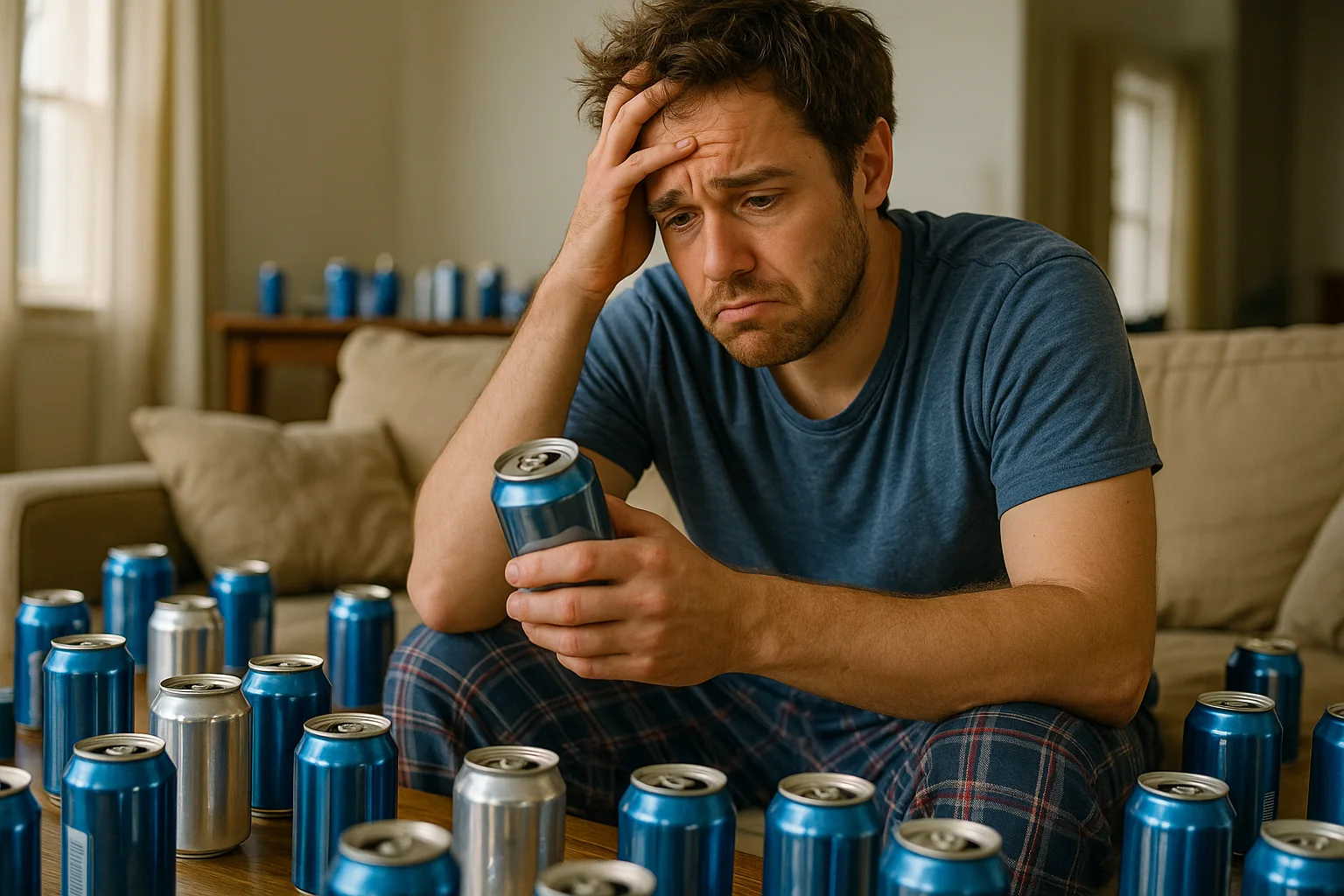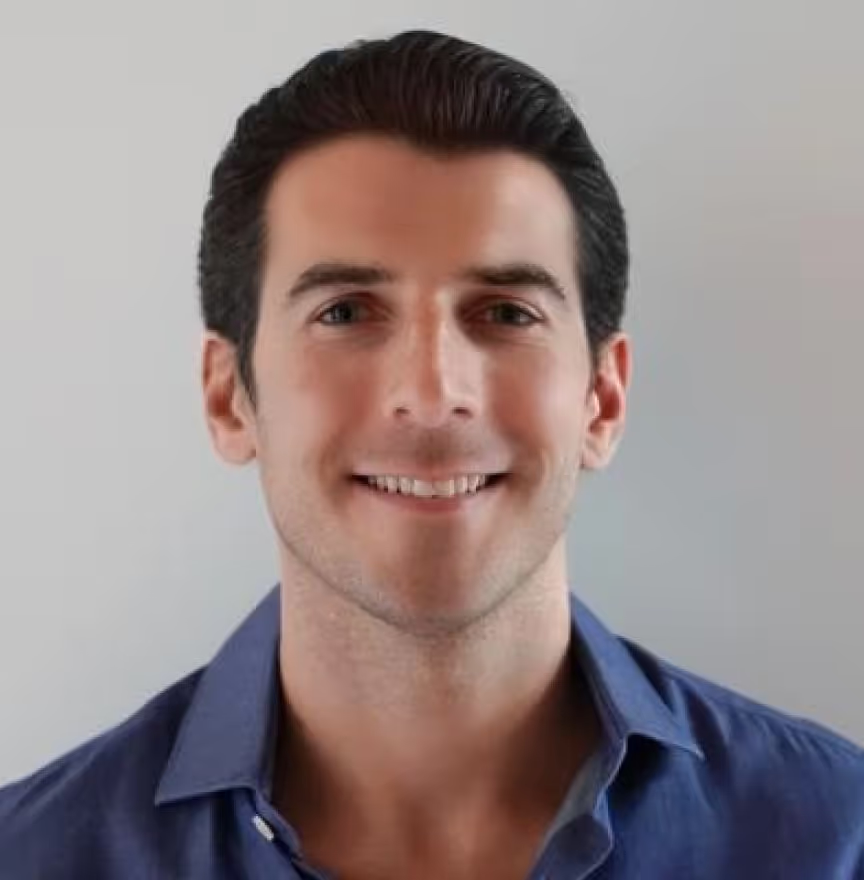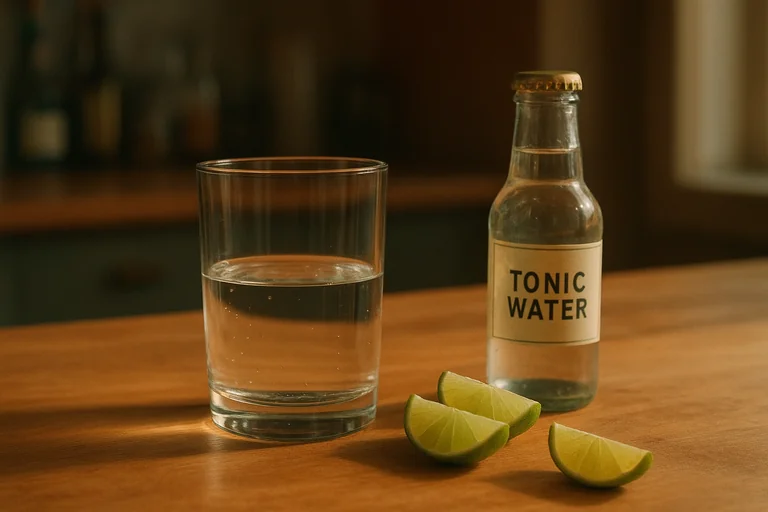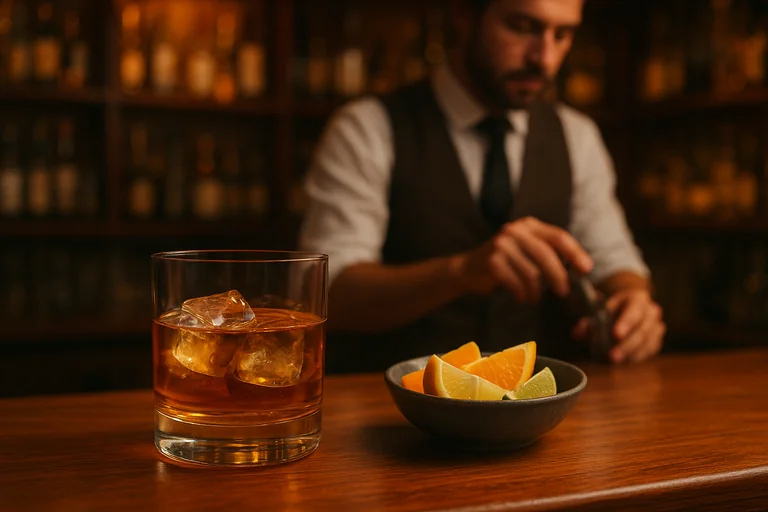A 2 minute assessment to get a personalized mental health or alcohol recovery plan.
Post-drinking guilt is a complex interplay of brain chemistry and psychology - understanding the science can help you break free from the cycle.
What You'll Discover:
- The neuroscience of post-drinking guilt and anxiety.
- How alcohol affects dopamine, cortisol, and serotonin levels.
- The psychology behind cognitive dissonance and shame.
- What hangxiety is and why it happens.
- Long-term consequences of the guilt-drinking cycle.
- Practical strategies to manage post-drinking guilt.
Have you ever woken up after a night of drinking and, before the headache even sets in, you're hit with a wave of guilt? That heavy feeling in your stomach, the endless loop of replaying conversations from the night before, and the nagging sense that you've done something wrong are all common experiences.
This phenomenon, often referred to as "hangxiety" or post-drinking guilt, is more than just a fleeting feeling of regret. It's a complex interplay of brain chemistry, psychology, and personal values.
The Neuroscience of Post-Drinking Guilt
The feelings of guilt and anxiety you experience after drinking are not just "in your head." They are the result of a very real and powerful chemical rollercoaster that alcohol puts your brain through.
The Dopamine Crash and the Search for a Reason
Alcohol temporarily boosts the levels of dopamine in your brain. Dopamine is often called the "feel-good" neurotransmitter because it's associated with pleasure, reward, and motivation. That initial surge of dopamine is what can make you feel more confident, relaxed, and sociable when you're drinking.
However, your brain is always striving for balance. In response to the artificial high created by alcohol, it quickly works to bring your dopamine levels back down. This sudden drop, or "crash," can leave you feeling low, anxious, and unsettled. Your brain, in its attempt to make sense of these negative feelings, starts searching for a reason. This is where self-criticism and guilt often come into play.
The Prefrontal Cortex's Morning-After Report
Your prefrontal cortex is the part of your brain responsible for executive functions like decision-making, impulse control, and self-awareness. When you're drinking, alcohol impairs the function of your prefrontal cortex. This is why "just one more" can so easily turn into several more.
The next morning, however, your prefrontal cortex is back online and in full "damage control" mode. It begins to review the choices you made the night before with a critical eye, often making them seem much worse than they actually were.
The Cortisol Spike and the Rise of "Hangxiety"
Cortisol is your body's primary stress hormone. While you're drinking, alcohol can actually lower your cortisol levels, contributing to that temporary feeling of relaxation. But once again, your brain's quest for balance comes at a cost.
The next day, your cortisol levels can rebound and even spike, leading to feelings of anxiety, irritability, and restlessness. This phenomenon is so common that it has been given its own name: "hangxiety." Your brain, now flooded with stress hormones, starts scanning for threats and problems, often magnifying minor social missteps from the night before into major sources of guilt and shame.
The Serotonin Slump and Social Self-Doubt
Serotonin is another neurotransmitter affected by alcohol. It plays a crucial role in regulating mood, sleep, and social behavior. Alcohol can temporarily increase serotonin levels, which can make you feel more confident and outgoing.
However, when your serotonin levels drop the next day, so does your self-assurance. You may find yourself plagued by social self-doubt, wondering if you were too loud, overshared, or said something you shouldn't have. This second-guessing is often more a reflection of your brain chemistry than of your actual behavior.
The Psychology of Post-Drinking Guilt
Beyond the chemical fluctuations in your brain, there are also powerful psychological factors that can contribute to feelings of guilt and shame after drinking.
Cognitive Dissonance: When Actions Don't Align with Values
Cognitive dissonance is the mental discomfort that arises when your actions are not in alignment with your values or beliefs. If you have set a goal to drink less, or if you simply want to make healthier choices, then a night of heavy drinking can feel like a betrayal of your own intentions. This internal conflict can be a powerful source of guilt and shame.
The "Shadow Self" and the Fear of Who We Become
The famous psychologist Carl Jung coined the term "shadow self" to describe the parts of ourselves that we prefer to keep hidden, even from ourselves. Alcohol, by lowering our inhibitions, can sometimes allow these "shadow" traits to come to the surface. You might become more emotional, argumentative, or reckless than you normally would.
Even if your behavior wasn't objectively "bad," the simple fact that you acted in a way that was out of character can be enough to trigger feelings of guilt and shame.
The Cycle of Shame and Alcohol Misuse
For some people, the relationship between shame and alcohol can become a vicious cycle. As a 2018 study published in PMC explains, shame can be both an antecedent to and a consequence of drinking. Feelings of shame can lead a person to drink as a way to escape from painful self-awareness. This, in turn, can lead to more problematic drinking, which can then lead to more shame.
This cycle can be difficult to break and is often a contributing factor to the development of alcohol use disorder.
Understanding Hangxiety
As if the physical symptoms of a hangover weren't bad enough, many people also experience a significant increase in anxiety the day after drinking. This phenomenon, known as "hangxiety," is a key contributor to feelings of guilt and shame. A 2023 study in the Journal of Clinical Medicine found that hangover-sensitive drinkers had significantly higher levels of anxiety and stress compared to hangover-resistant drinkers.
What Causes Hangxiety?
Hangxiety is caused by a combination of the neurochemical changes we've already discussed, as well as other factors such as poor sleep, dehydration, and low blood sugar. The combination of these factors can leave you feeling on edge, irritable, and unable to cope with even minor stressors.
The Link Between Hangxiety and Guilt
The heightened state of anxiety that comes with hangxiety can make you more likely to ruminate on the events of the night before. You may find yourself obsessively replaying conversations, worrying about what you said or did, and imagining the worst-case scenario. This can lead to a spiral of guilt and shame, even if you have no real reason to feel that way.
Long-Term Consequences of the Guilt-Drinking Cycle
While a single night of post-drinking guilt may seem like a temporary inconvenience, a repeated pattern of this behavior can have serious long-term consequences.
Increased Risk of Alcohol Use Disorder - The cycle of drinking to cope with feelings of shame can be a major contributing factor to the development of alcohol use disorder. The more you drink to cope with shame, the more your tolerance increases.
Worsening Mental Health - The constant cycle of guilt, shame, and anxiety can take a serious toll on your mental health. It can lead to or exacerbate conditions such as depression, anxiety disorders, and low self-esteem.
Damage to Relationships - The behaviors that often accompany heavy drinking, such as arguments, broken promises, and emotional outbursts, can damage your relationships with friends, family, and romantic partners.
Breaking the Cycle: Practical Strategies
If you find yourself regularly struggling with feelings of guilt and shame after drinking, know that you are not alone and that there are steps you can take to break the cycle.
1. Reframe Guilt as a Signal, Not a Sentence - Guilt can be a useful signal that your actions are not in alignment with your values. Instead of letting guilt spiral into shame, try to view it as an opportunity for self-reflection. Ask yourself: What can I learn from this experience?
2. Practice Self-Compassion - It's easy to be hard on yourself after a night of drinking, but self-criticism is rarely productive. Instead, try to practice self-compassion. Treat yourself with the same kindness and understanding that you would offer to a friend in a similar situation.
3. Identify Your Triggers - What are the specific situations, people, or emotions that tend to lead to a night of heavy drinking? By identifying your triggers, you can begin to develop strategies for managing them.
4. Make a Plan for Next Time - If you choose to drink, make a plan in advance. This might include setting a limit on the number of drinks you will have, alternating alcoholic drinks with water, or arranging for a safe ride home.
5. Address the Physical Symptoms - Since hangxiety is a major contributor to post-drinking guilt, it's important to address the physical symptoms of your hangover. This includes rehydrating with water and electrolytes, eating a nutritious meal to stabilize your blood sugar, and getting some rest.
6. Challenge Your Negative Thoughts - When you're in the grip of post-drinking guilt, it's easy to get caught up in a spiral of negative thoughts. Challenge these thoughts and question their validity. Ask yourself: Is there any real evidence to support this thought?
7. Seek Professional Help - If you are struggling to manage your drinking on your own, or if you find that your drinking is having a negative impact on your life, it may be time to seek professional help. As a Psychology Today article on the topic of shame and alcoholism notes, seeking help is a sign of courage and strength.
Your Path to a Healthier Relationship with Alcohol
Feeling guilty after drinking is a common and often distressing experience. It's the result of a complex interplay of brain chemistry, psychology, and personal values. By understanding the science behind post-drinking guilt, you can begin to see it not as a personal failing, but as a natural response to the effects of alcohol on your brain and body.
If you're tired of the cycle of drinking, guilt, and regret, know that you have the power to change. By practicing self-compassion, identifying your triggers, and making a plan for the future, you can begin to build a healthier and more mindful relationship with alcohol.
Ready to explore your options? Take the Alcohol Use Assessment to learn more about your drinking patterns.
References
[1] PMC. "Is Shame a Proximal Trigger for Drinking? A Daily Process Study with a Community Sample" https://pmc.ncbi.nlm.nih.gov/articles/PMC6362831/
[2] Psychology Today. "Alcoholism and Shame" https://www.psychologytoday.com/us/blog/the-high-functioning-alcoholic/201604/alcoholism-and-shame
[3] PMC. "Depression, Anxiety, and Stress among Hangover-Sensitive and Hangover-Resistant Drinkers" https://pmc.ncbi.nlm.nih.gov/articles/PMC10145060/




